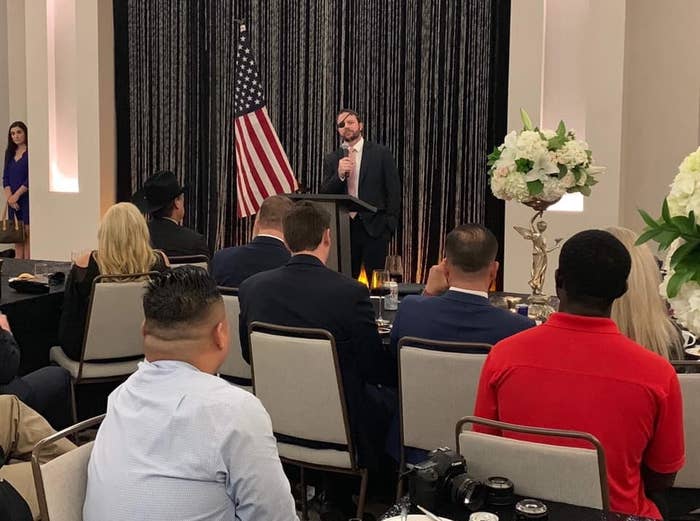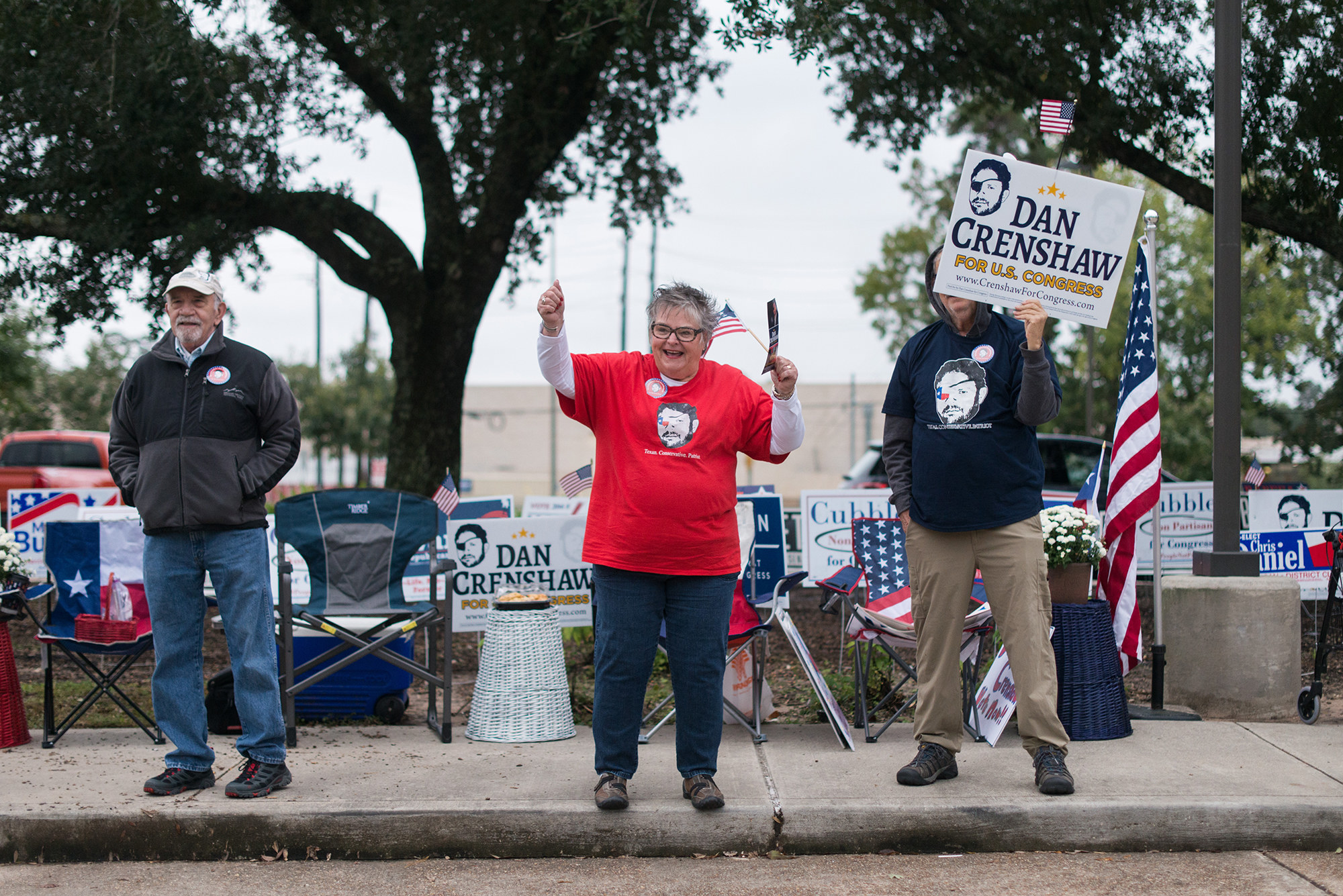
SAN ANTONIO — Voters in Texas watched on a year ago as Democrat Beto O’Rourke came within an inch of taking Republican Sen. Ted Cruz’s seat in the closest Senate race Texas has seen in decades.
Cindy Ochoa, 22, was anxiously watching, too — but she was preoccupied with another fight, counting election results county by county in the frantic campaign “war room” for her boss, Republican Rep. Will Hurd.
Elections have been tight in Texas’s 23rd Congressional District for years, but last year’s race came down to less than 1% of the vote — Hurd won by some 800 ballots.
Any relief from the Hurd and Cruz victories didn’t last long. Democrats took two congressional seats from Republicans and 47% of the total vote that night. Six Texas Republicans have since announced they are retiring and not running for reelection next year. That includes Hurd, the only black Republican in the House and a rare critic of President Donald Trump.
Ochoa and other young Republicans in Texas say Hurd’s close call in 2018 and the exodus of House Republicans is just the latest sign that politics in their state are shifting. Between a changing Texas and navigating the downstream effects of Trump’s volatile brand of politics in Washington, they’re not sure their party is prepared for what’s shaping up to be a pivotal moment.
“People just don’t want to talk about where the party is right now, and where it’s going, and that it’s very likely to be turned blue in 2020,” Ochoa, a district staffer in Hurd’s office, told BuzzFeed News in San Antonio. “We don’t have the greatest person leading our party, so it’s a tough spot for Republicans right now, but I think we need to get serious and stop being naive about what’s going on and actually face the facts.”
Republicans in Texas are facing an identity crisis, revealed in nearly two dozen conversations with BuzzFeed News in recent weeks. With a new generation rising up in Texas, the party is struggling to decide what it should look like in the years to come — torn between embracing Trump as closely as possible and adapting to broaden the party’s appeal to young and Latinx people.
Latinos in Texas are projected to overtake white Texans as the largest population group by 2022, according to the Texas state demographer, and other communities of color, too, continue to grow in the state. The significant upswing in support for O’Rourke compared to previous Democratic statewide candidates came primarily from suburban voters, particularly in the fast-growing and diversifying Houston, Dallas, Austin, and San Antonio suburbs — areas that have traditionally leaned Republican.
There was also a staggering increase in the number of young voters who cast a ballot in 2018 in Texas — more than 1 million in total, a 234% increase from the previous midterms in 2014.
And even though Trump won a majority of Texas’s vote in 2016 and beat Hillary Clinton by nine points, Trump is unpopular in the state. A Quinnipiac poll in September showed 45% of registered voters in Texas approved of Trump with 50% disapproving. And 48% of Texas voters said they would definitely not vote for Trump in 2020, compared to just 35% who said they definitely would.
This does not mean a Democratic wave in Texas is likely, especially as soon as 2020. Polling in the state in 2016 showed a narrower margin for Trump than he ultimately won, even in the days before the election. Recent polling from the University of Texas/Texas Tribune shows Trump still edging out Democrats Joe Biden, Elizabeth Warren, and Bernie Sanders in a head-to-head race. Some Republican operatives are confident that the party is generally on solid ground in the state. They put the 2018 losses and close calls down to a “down ticket effect” driven by the momentum O’Rourke’s Senate campaign generated, which they don’t believe Democrats can sustain into 2020, when Trump will be on the ballot.
Republicans running down-ballot in Texas, though, will be in a tough spot next year, another veteran Republican strategist told BuzzFeed News. Those candidates, the strategist said, will likely need to swing further to the right during their primary campaigns to win over the party’s base, which has rallied around Trump after House Democrats announced the impeachment inquiry. In the general election, they’ll need to do the opposite, convincing moderates and conservatives in the suburbs who have been cooling on Trump that they’re not beholden to the president.
At the Texas Young Republicans Convention in Houston last month, many young Texans who represent the next generation of the party said they see this as a moment when the party needs to actively define itself outside of Trump’s messaging and agenda and embrace different voices if it’s going to hold off Democratic gains.
One of those possible new voices belongs to Rep. Dan Crenshaw — whose face was emblazoned on posters, tote bags, and even a cake at the young Republicans’ gathering. Crenshaw, who was first elected in 2018, is one of only two millennials among Texas’s 23-strong Republican delegation in the US House of Representatives.

“The youth is why we’re losing Texas. It’s not Californians moving in, it’s not New Yorkers moving in — the reality is they tend to vote Republican,” said Crenshaw, addressing young Republicans from all over Texas at the convention’s gala dinner.
He talked at length about the need for Republicans to think about how they can draw younger voters and clarify what exactly they stand for. He seemed to be acutely aware that relying on the traditional Republican base in Texas might not be enough in places like his own suburban Houston district, which he won by about 7% in 2018 — not as close as some Texas districts, but far closer than the 24-point win his Republican predecessor captured in 2016.
“We’re not reaching them, we’re not telling them why Republicans are right, we’re not telling them why our approach to governance is the correct one,” he said. “We get too mired in details and start insulting Democrats, and people don’t like that, they don’t understand what we’re talking about.”
“Being personally liberal that doesn’t make you politically left-leaning. We have to distinguish that. I think the left thinks they’re winning the youth in Texas, and frankly they are, but we’re making a comeback, we’re making a very hard comeback,” he said.
Crenshaw’s political profile is on the rise here — he has so far raised around $3 million, giving him an advantage going into the race next year to hold onto his mostly suburban Houston seat in 2020. But he, too, has been willing to publicly criticize the president. Most recently, he released a long video critiquing the president’s decision-making on Syria, and in the past has called on Trump to lay off taunting former senator John McCain.

“The party’s got to decide what it is that the grassroots of the party really stands for, because it seems like there is a growing divide between the elected officials and what the grassroots of the Republican Party is looking for,” said James Rains, vice chair of the Texas Young Republicans, speaking to BuzzFeed News at the opening reception of the convention.
The young conservatives who spoke to BuzzFeed News had differing thoughts about what specifically that means, and how the party should define itself.
Rains said he particularly wants Republicans to emphasize issues like gun control and spending, “boring things that aren't really kitchen table issues, but issues that really work to drive the Republican vote in Texas.”
Some young Republicans trace the party’s problems back before O’Rourke’s Senate run, and even before the Trump era.
Houston-based Artemio “Temo” Muniz, 38, founded an auxiliary group of the state GOP focused on Latino membership and outreach in 2009. The Texas Federation of Hispanic Republicans parted ways with the establishment in 2014 because it couldn’t support the party’s anti-immigrant platform.
“I have personally believed for years that you cannot have effective outreach, Hispanic outreach, by the Republican Party without a legal pathway for illegal immigrants,” Muniz said.
Muniz said he’s been trying to get the message across for a long time that Republicans aren’t taking Latino outreach seriously enough in Texas. He said the party’s challenges now are part of much longer-standing problems, which have been exacerbated under Trump. He thinks the underlying problem is that over the years the party has not upheld its unique Texas brand of conservatism, putting candidates in a position where “local relationships can’t overcome the Trump brand.”
“I think the Republican Party of Texas and the RNC’s full embrace of the Donald Trump brand, for Texas it’s a critical mistake,” he said, adding that the party has abandoned the Texas brand of conservatism that he says George W. Bush, Rick Perry, and to some extent Gov. Greg Abbott built — an approach that’s emphatically pro-businesses and “doesn’t attack the immigrant.”
“I think we’re running out of time. We’re like a bunch of political dinosaurs and my party is practicing extinction politics,” he said, adding that he’s starting to work with donors independent of the state party to come up with strategies to keep the state red.
Brooks Melton, the 19-year-old chair of his college Republican group in Tyler, echoed some of the concerns Muniz raised. He’s worried that in following Trump’s lead, the party has strayed from the “compassionate conservatism” he believes in, which includes a willingness to consider more inclusive immigration reform.
“I think the key to keeping Texas red is really appealing to the Hispanic demographic that’s moving into the state,” Melton said. “You have a lot of Catholic and Evangelical Protestant influence in the Hispanic community. I think the social conservative side of our party could really appeal to them and we could really be a help to the Hispanic community.”
“I think our tone on immigration is a big part of that too. I think we need to watch our tone,” he said, adding, though, that it’s complicated, and he knows at least one Latino Republican who supports Trump’s efforts to build a wall along the southern border.
Matt Mackowiak, an Austin-based Republican strategist working to keep Hurd’s district red in 2020, is less worried about the party’s immediate future, even as he acknowledged that “the risk is there and people are taking it extremely seriously.”
Republicans, Mackowiak said, have traditionally had an advantage in the state’s suburbs — and while they saw losses there in 2018 because of Trump’s faltering popularity, he thinks they’ll have an advantage there again in the presidential race.
“Though Trump is still viewed warily in the suburbs, the Democrats are really far left nationally, and I think if their nominee is Warren or someone like that there’s going to be much more potential for us to win back the suburbs.”
But Cindy Ochoa said she thinks the party is losing touch with what she sees as the foundation of Republican politics: small government and individual liberties over government intervention and legislation.
She, too, is worried about how Trump’s rhetoric plays out on the ground in Texas — something other young conservative Latinos say they find hard to reconcile, though Trump continues to hold between around 20%–30% of Latinos’ support in national polling, roughly the average for all modern-day Republican presidents.
Ochoa pointed to “not just the way [Trump]’s directed policy but in the way he acts and the way he thinks it’s okay to treat and respond to people.”
She thinks part of the reason Hurd and others are choosing to leave public office next year is that “it’s harder for common sense Republicans to get reelected because we have such a separation in our party with our very, very conservative Trumpers and our common sense Republicans.” ●
CORRECTION
There are 36 members in Texas's congressional delegation in the House, 23 of whom are Republicans. A previous version of this story misstated the number.

